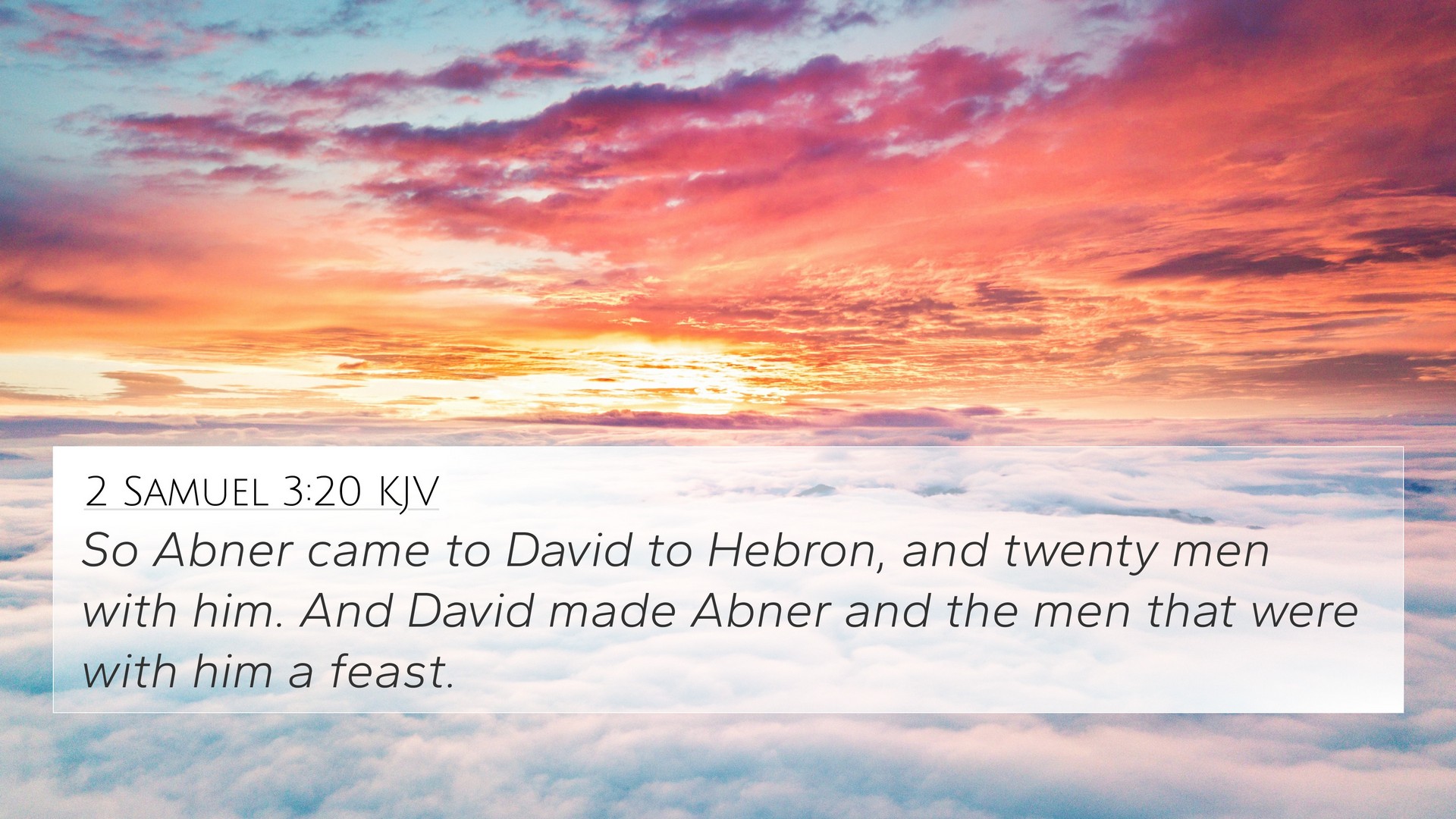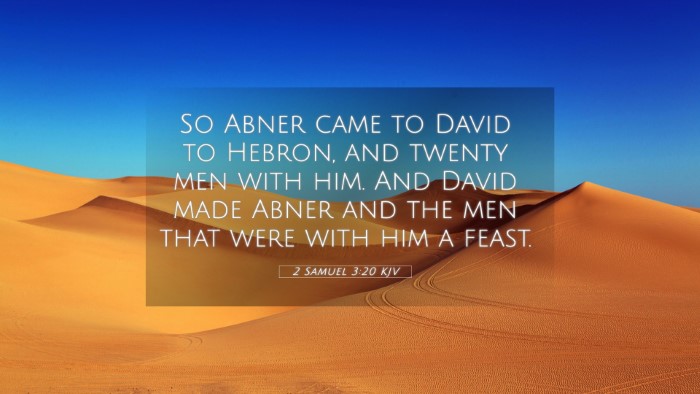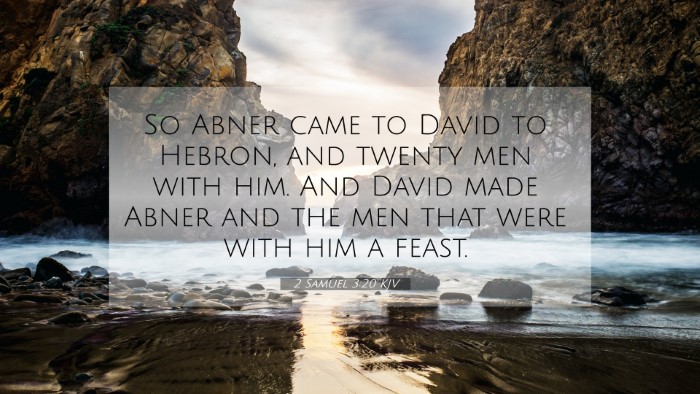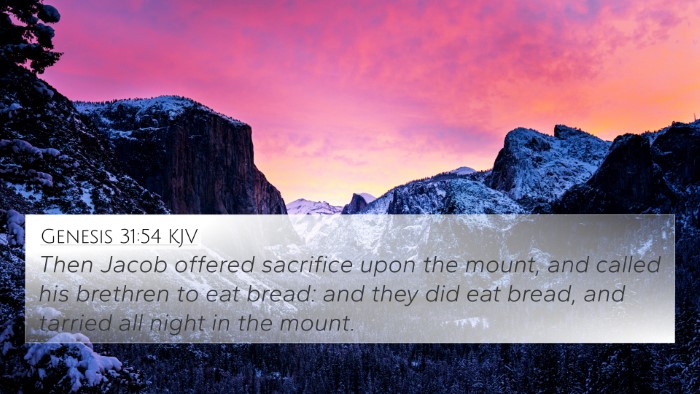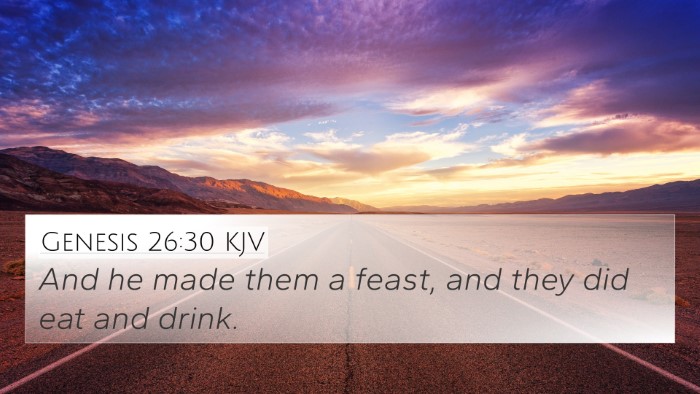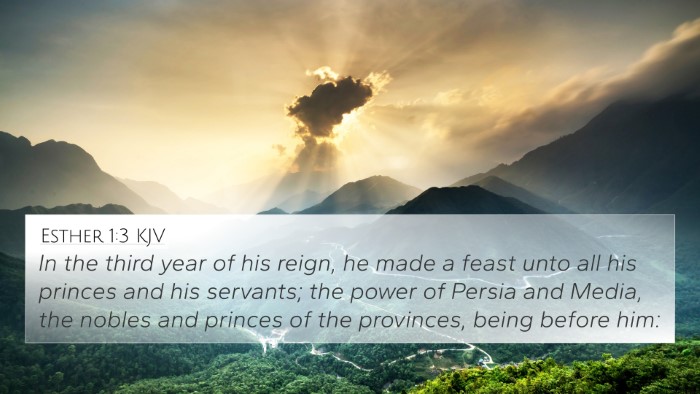Understanding 2 Samuel 3:20
2 Samuel 3:20 reads: "And Abner came to David to Hebron, and twenty men with him. And David made Abner and the men that were with him a feast."
This verse marks a significant moment in the unfolding narrative of King David's rise to power and the reunification of the Israelites under his kingship. It depicts Abner, the commander of Saul's army, visiting David with a retinue, which symbolizes the shifting allegiances within Israel's political landscape.
Insights from Commentaries
Drawing from various public domain commentaries, we can gain deeper insights into the meaning and implications of this verse.
Matthew Henry's Commentary
According to Matthew Henry, this event illustrates the eventual transition of power from Saul's lineage to David. His commentary emphasizes the importance of Abner's alliance with David as a turning point in the broader context of Israel's unity. Henry notes that David's hospitality towards Abner is indicative of David's character and his desire for peace rather than conflict.
Albert Barnes' Commentary
Albert Barnes points out that Abner's coming to David represents a recognition of David's rightful claim to the throne. This act can be interpreted as an acknowledgment of God’s choice of David as king. Barnes highlights the feast as a gesture of goodwill and reconciliation, which is pivotal in fostering unity in a time of division within the nation.
Adam Clarke's Commentary
Adam Clarke adds that Abner's visit and the subsequent feast signify a moment of diplomacy. The bringing of twenty men with him indicates not just a personal visit but a delegation, reinforcing the political undertones of the meeting. Clarke underscores the importance of such gatherings in ancient Near Eastern cultures, suggesting that this feast served not only to honor Abner but to solidify alliances.
Cross-References and Related Verses
This verse can be linked to several other scripture passages that reveal the broader themes of leadership, peace, and reconciliation. Here are 10 Bible verses that relate to 2 Samuel 3:20:
- 2 Samuel 2:4 - Describes David being anointed king over Judah, setting the stage for his future reign.
- 1 Chronicles 11:1-3 - Reflects on the same anointing, highlighting the unity of the tribes under David.
- Psalm 133:1 - Emphasizes the beauty of unity among brethren, mirroring David’s desire for a unified kingdom.
- Isaiah 11:13 - Prophecies concerning the division and then reunification of Israel, relevant to David's time.
- Acts 2:30 - Connects to David’s timeline and God’s covenant with him as seen through the lens of New Testament revelation.
- 1 Samuel 18:1-4 - Explores the bond between David and Jonathan, symbolizing loyalty that transcends political dynamics.
- 2 Samuel 5:1-3 - Marks the culmination of David’s kingship with all tribes coming to him at Hebron.
- Matthew 5:9 - Jesus’ beatitude on peacemakers can be seen as reflective of David’s approach towards Abner.
- Hebrews 13:1 - Calls for brotherly love, resonating with the reconciliation David sought through this feast.
- Luke 22:29-30 - Highlights the significance of tables and feasting in terms of kingdom fellowship, echoing David’s actions.
Thematic Connections
The themes of reconciliation and unity are central in 2 Samuel 3:20. This verse can be viewed as part of an inter-Biblical dialogue regarding leadership and conflict resolution.
The hospitality extended by David to Abner sets a precedent for future interactions among leaders, emphasizing the importance of peace in achieving God's purposes.
Tools for Bible Cross-Referencing
To delve deeper into the connections between Bible verses, various tools and methods can aid in bible cross-referencing. Utilizing a bible concordance, bible cross-reference guide, and understanding cross-reference Bible study methods provides a comprehensive approach to enriching one's study and application of scriptures.
Conclusion
In summary, 2 Samuel 3:20 illustrates a significant moment in the prophetic and historical framework of the Israelite people. By examining this verse through various commentaries and exploring its connections with other scriptures, one can gain a deeper understanding of its meaning and implications. The themes of unity and the transformative power of reconciliation resonate throughout the Bible and serve as vital lessons for believers today.
